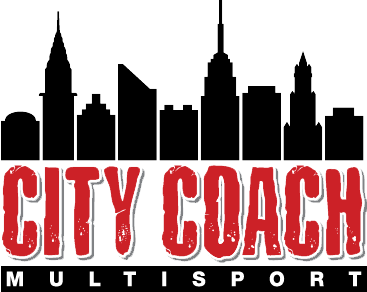N(ewbie)YRR Sprint Tips
"At that point in the race (less than a mile to go) you close your eyes, grit your teeth and go for it. I think it was his inexperience - he’ll look back at this race and see it as the one that got away. You don’t drink at the last aid station." Ironman winner Chris McCormack
So you’re a runner turned triathlete new to the sport or a wanna-be triathlete. Either way, I bet you are terrified. Here are a couple tips that I hope will lessen the fears and have you looking like a seasoned veteran:
1. Not all triathlons are Ironmans. Sign up for a sprint to get accustomed to racing the different disciplines. The NYRR Sprint Tri is a good one to try. If it's run like it was the last 2 years, I fully endorse it. Later, consider the different lengths: sprint, Olympic, half (half-Iron),full (full Iron).
2. The swim seems to be scariest for most, so a pool swim is a great option. Pool swims are time trials, so there is no mass start. For the love of all that is good and holy, learn what your splits are. You will line up at the start according to your predicted time. Just as in a running race, lying about your time, really serves no advantage and is simply obnoxious and disrespectful to your competitors. Folks will have greater incentive to swim right over you.
3. Practice transitions. Go into your transition knowing what you are doing first, second, third…This is no time to think.
4. Nutrition. In a sprint, a gel is more than sufficient. You really don’t need more than this. I like to take one bottle mixed with half Gatorade, half water on the bike. I have the gel at the beginning of the ride.
5. Do a few bricks in training. There is nothing else that prepares you for the wobbly legs from bike to run.
6. Don’t let your bike prevent you from signing up for a race. You will see old clunkers, fancy disc wheels, mountain bikes, bikes that cost more than a car, etc. at races. If it’s your first tri, your goal should be to have fun. Once you have decided that you want to invest in the sport, do so incrementally. The best investment you can make is improving your fitness. The rest of the stuff is expensive and secondary. (That said, if someone offers you a good bike at a good rate, learn to grow into it!) My bike store of choice is www.Brickwell.com. Great folks and prices, and they have been a sponsor and competitor at the NYRR Tri.
7. Be in the moment. While you are swimming, focus on the swim. Don’t think about the bike. But don’t race each as an isolated event. Don’t expend so much energy that you are spent for the next transition.
8. Bike on the right and stay on the right unless you are passing. Pass on the left.
9. No drafting on the bike. That is cheating. Cheaters stink.
10. Like music? Good. Sing to yourself. Headphones will get you an automatic DQ.
11. After the bike transition, TAKE OFF YOUR HELMET. Do NOT start the run with your helmet. Seems obvious, but…
12. The run is the last leg, and I think, the most difficult. You’re tired. It is more important than anything to stay positive. Think about why you are out there, all the people who love you, and how proud you are of yourself.
13. Visualization is necessary; delusion is destructive. See yourself completing the race and accomplishing your goals. However, think that you can run the final leg faster than your stand-alone road race and you are setting yourself up for disappointment. I can watch Kara Goucher race, and try to mimic her training/nutrition plan, but I will never be Kara Goucher. Simply put, she is way more talented than I. That said, she inspires me and I try to learn from her. Am I running a 30 min 10K? Visualize away, not a chance.
14. Speaking of Kara Goucher, one of the things I LOVE about her is when she puts on a bib, she makes no excuses. Pin on your bib (get a race belt from www.jackrabbitsports.com), give your best effort, and for goodness sake, no belly-aching about the course, the race, the officials, or anything else that deprived you of being an Olympian. Just enjoy yourself.
15. If you have a chance, scout the course. It will settle the mind if you realize the course isn't more difficult than what your very vivid and active mind could conjure up. (Tip: if you're doing the NYRR sprint, that first left turn on the bike is a hard left. Slow down. http://citycoach.typepad.com/nsq/2010/08/my-mothers-daughter.html)
16. Lastly, a coach is very helpful in organizing your training. It’s difficult to put together an adequate training plan. Too much of one thing, not enough of the other. if you're thinking of hiring a coach, it's worth noting that both the men's and women's divisions have been won by City Coach athletes. www.citycoach.org
